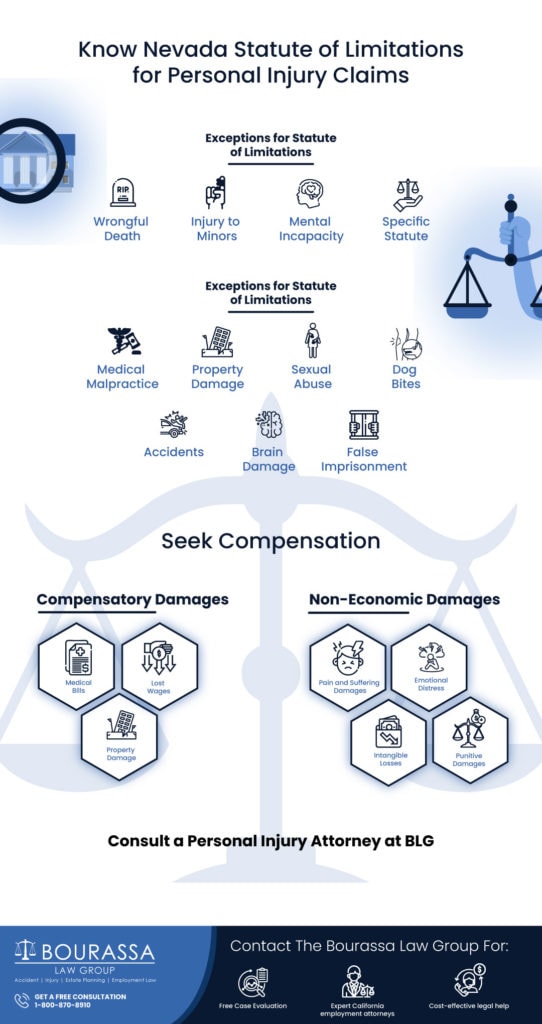
Unexpected personal injuries can lead to substantial physical, emotional, and financial challenges. If you’re thinking about filing a personal injury claim in Nevada, it’s important to be aware of the state’s statute of limitations for these cases. This legal guide is designed to help you understand the intricacies of Nevada’s personal injury laws, so you can pursue the compensation you’re entitled to.
What is a Statute of Limitations?
Before diving into Nevada’s specific regulations, let’s start with the basics. A statute of limitations is a legal time limit within which an injured person must file a lawsuit against the at-fault party to seek compensation for their damages. The purpose of these limits is to promote fairness and prevent claims from being filed long after the injury occurred.
When Does the Statute of Limitations Begin?
In Nevada, the statute of limitations for personal injury case is generally two years. This means that you have a two-year time frame to initiate a personal injury lawsuit from the date the injury occurred. If you don’t file your lawsuit within this period, you may lose your right to seek compensation for your injuries.
What Are the Exceptions for Statute of Limitations in Nevada?
While the standard statute of limitations for personal injury claims is two years in Nevada, certain exceptions can alter the timeframe within which you can pursue legal action:
Wrongful Death:
In cases of wrongful death, where a person’s death is caused by someone else’s actions, the statute of limitations is two years from the date of the person’s death. This allows the deceased person’s estate to file a lawsuit seeking compensation for the losses suffered by the surviving family members.
Injury to Minors:
When a child is injured, the statute of limitations may not begin until the child reaches the age of 18. This is because a minor may not be in a position to fully understand their rights or the consequences of their injuries.
Mental Incapacity:
If the injured party is mentally incapacitated at the time of the injury, the statute of limitations may be extended until they regain the capacity to understand their legal rights.
Specific Statute:
Some types of cases are governed by specific statutes with different time limits. For instance, claims arising from sexual abuse have a longer statute of limitations in Nevada.
Types of Personal Injury Claims Covered
Nevada’s statute of limitations for personal injury cases covers a wide range of claims, including but not limited to:
Dog bites
Accidents
Brain damage claims
False imprisonment cases
Personal injuries resulting from accidents, negligence, or intentional acts
What Are the Nevada Personal Injury Laws?
Nevada personal injury laws encompass a wide range of cases, from accidents and dog bites to wrongful death claims. These laws are rooted in the legal theory that those responsible for causing injuries should be held accountable for their actions.
Negligence and Personal Injury Cases
The foundation of many personal injury cases is the legal concept of negligence. Negligence occurs when a person or entity fails to exercise reasonable care and, as a result, causes harm to another person. To establish a successful personal injury claim in Nevada, the injured party (plaintiff) must prove the following elements:
Duty of Care:
The defendant (the party allegedly at fault) owed a duty of care to the plaintiff. For instance, drivers have a duty to operate their vehicles safely and follow traffic laws.
Breach of Duty:
The defendant breached their duty of care through an action or omission. This could include actions like speeding, texting while driving, or failing to maintain a safe property.
Causation:
The breach of duty directly caused the plaintiff’s injuries. It must be established that the defendant’s actions or negligence were the proximate cause of the harm suffered by the plaintiff.
Damages:
The plaintiff sustained actual damages, such as medical expenses, lost wages, pain and suffering, and other losses as a result of the injury.
If all these elements can be proven, the plaintiff may have a valid personal injury claim against the at-fault party.

Compensatory and Non-Economic Damages
When you pursue a personal injury claim in Nevada, you may be entitled to different types of damages, such as:
Compensatory Damages:
These are designed to compensate you for the financial losses you’ve incurred as a result of your injury. Most personal injury cases involve an injured person seeking compensation for the harm they’ve suffered. This compensation can cover a variety of losses, including:
Medical Bills: Reimbursement for expenses related to medical care, rehabilitation, and ongoing treatment.
Lost Wages: Compensation for income you may have lost due to the injury.
Property Damage: Compensation for damage to your personal property, such as your vehicle in a car accident.
Non-Economic Damages:
These are more challenging to quantify and can include pain and suffering damages, emotional distress, and other intangible losses.
In some cases, punitive damages may also be awarded to punish the at-fault party for their negligent actions.
Importance of Legal Representation
Navigating the statute of limitations for Nevada personal injury claims can be complex and challenging, particularly if you’re dealing with a severe injury, medical malpractice, or other intricate legal matters. Having an experienced attorney by your side can make all the difference.
An attorney can help you:
Prove Negligence:
Your attorney will gather evidence and build a strong case to demonstrate that the at-fault party’s negligent actions violated your rights.
Handle Settlement Negotiations:
Your attorney can negotiate on your behalf with the at-fault party or their insurance company to reach a fair settlement.
File a Lawsuit:
If a settlement cannot be reached, your attorney will initiate a personal injury lawsuit on your behalf, representing your interests in court.
Prepare for Trial:
In the event that your case goes to trial, your attorney will provide you with expert legal representation to seek the compensation you deserve.
In Nevada, many personal injury attorneys offer a free consultation to discuss the specifics of your case. During this initial consultation, you can discuss the circumstances of your injury and explore your legal options. This is an excellent opportunity to ask questions and determine if you need legal representation.
Consult a Personal Injury Attorney at The Bourassa Law Group

Understanding Nevada’s statute of limitations and personal injury law is essential if you’re considering pursuing legal action. By adhering to the time limits and seeking the right legal representation, you can increase your chances of a successful outcome. Remember that every case is unique, so it’s vital to consult with an experienced personal injury attorney to navigate the complexities of Nevada’s legal system and seek justice for your injuries. If you have any questions or concerns, don’t hesitate to reach out for a free consultation to protect your rights and pursue the compensation you need.
Las Vegas residents and others throughout the state can rely on experienced attorneys to guide them through this challenging process, ensuring that their rights are upheld and their suffering is acknowledged within Nevada’s legal framework.
Ready to explore your legal options and ensure your rights are protected? Don’t wait! Contact our experienced team of Personal Injury Attorneys at BLG for a FREE consultation. Let us guide you through the legal complexities of your case and help you pursue the justice and compensation you deserve. Act now to secure your future.
Schedule your free consultation appointment today!





